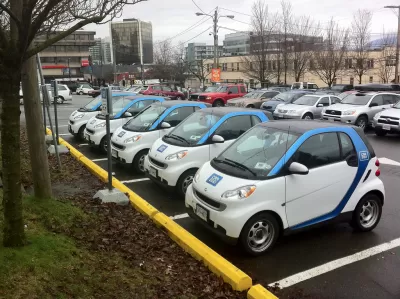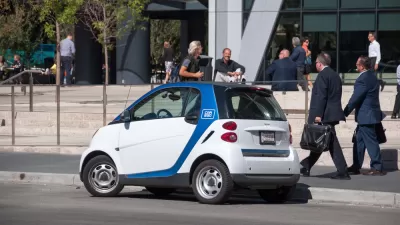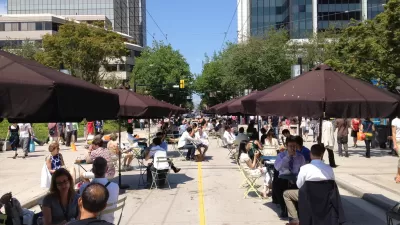As car sharing services like Car2Go have infiltrated cities including Vancouver, B.C., benefits of reduced car ownership and greenhouse gas emissions are being realized, a new study finds.

A recent study from researchers at the University of California at Berkeley has good news for cities that have embraced car sharing. Bethany Lindsay reports in the Vancouver Sun that the researchers looked at the effects of the Car2Go car sharing service in five cities in North America, including San Diego, Vancouver, Washington, D.C., Seattle, and Calgary. Users of the service who were surveyed by researchers reported fewer miles travelled by car which in turn has reduced the amount of pollution released into the atmosphere. The study also found that some users of the Car2Go service had either sold their personal vehicles or had decided not to buy a car in the first place.
Vancouver saw the largest overall impact on the number of private cars on the road, with an estimated reduction of 8,243 vehicles in 2015. For every Car2Go vehicle on Vancouver’s streets, about two members said they had sold their vehicles and another seven said they had postponed buying a car. Overall, the researchers estimate that Vancouver members reduced vehicle travel by as much as 60 million kilometres in a year, which may have prevented the release of 10,000 tonnes of greenhouse gases.
The research also found that a large number of Car2Go users had reduced their use of taxis and buses, however they hadn't reduced their use of SkyTrain or how often they walked or bicycled. The researchers said that previous studies on the use of ZipCar and Modo had found similar outcomes.
FULL STORY: 5 things: Car-sharing study reveals reduction in pollution, travel, vehicle purchases

Alabama: Trump Terminates Settlements for Black Communities Harmed By Raw Sewage
Trump deemed the landmark civil rights agreement “illegal DEI and environmental justice policy.”

Study: Maui’s Plan to Convert Vacation Rentals to Long-Term Housing Could Cause Nearly $1 Billion Economic Loss
The plan would reduce visitor accommodation by 25% resulting in 1,900 jobs lost.

Why Should We Subsidize Public Transportation?
Many public transit agencies face financial stress due to rising costs, declining fare revenue, and declining subsidies. Transit advocates must provide a strong business case for increasing public transit funding.

Wind Energy on the Rise Despite Federal Policy Reversal
The Trump administration is revoking federal support for renewable energy, but demand for new projects continues unabated.

Passengers Flock to Caltrain After Electrification
The new electric trains are running faster and more reliably, leading to strong ridership growth on the Bay Area rail system.

Texas Churches Rally Behind ‘Yes in God’s Back Yard’ Legislation
Religious leaders want the state to reduce zoning regulations to streamline leasing church-owned land to housing developers.
Urban Design for Planners 1: Software Tools
This six-course series explores essential urban design concepts using open source software and equips planners with the tools they need to participate fully in the urban design process.
Planning for Universal Design
Learn the tools for implementing Universal Design in planning regulations.
Caltrans
Smith Gee Studio
Institute for Housing and Urban Development Studies (IHS)
City of Grandview
Harvard GSD Executive Education
Toledo-Lucas County Plan Commissions
Salt Lake City
NYU Wagner Graduate School of Public Service





























